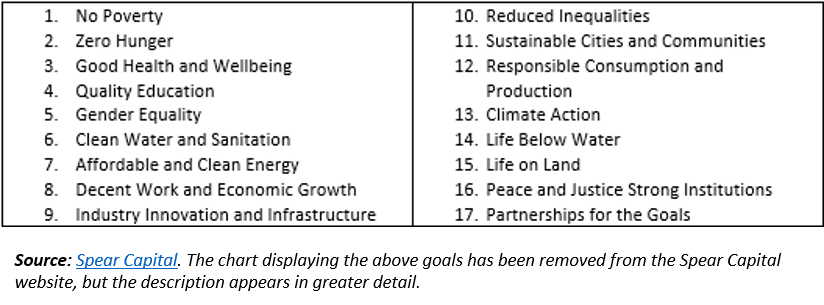Coming to a School Near You:
Environmental Social Governance
Although in development for decades, Environmental Social Governance, or ESG, has bloomed in business and higher education circles over the past two years. Like many draconian measures forced on American citizens and institutions since the start of 2020, purveyors of ESG are using the pandemic as an excuse to further their agenda. While the business sector and academia are already involved, K-12 education appears to be next on the list to be conquered.
As with all facets of socialist control efforts, ESG concepts are purposefully nebulous and vague. It is an international movement that appears to have begun in Europe and is spreading over the globe, having made inroads not only in Europe, but in parts of Africa and the Middle East, as well as in some U.S. corporations and universities. ESG invokes the familiar climate change fearmongering: global warming, rising sea levels, air pollution, sea pollution, child labor exploitation, and call for "a greener future." Diversity and inclusion are also part of the picture.
The Global Goals for Sustainable Development work hand in hand with ESG. Seventeen stated goals for a global utopia include:
One may observe that these goals are not new; they persist from years past but may be accompanied by new rhetoric and new implementation tactics.
ESG in business
For businesses, ESG means becoming "carbon neutral" by a certain date, typically by 2030. It means meeting a plethora of other criteria; such as adherence to international "sustainability" standards, which begs the questions: Who determines the standards? Who measures compliance?
According to Deloitte.com (of Deloitte Touche Tohmatsu Limited), beginning in 2023, "almost 50,000 companies will now have to report on ESG issues." Furthermore, the Hungarian Stock Exchange (BéT) "has issued a recommendation to all issuers that they develop an ESG reporting roadmap by the end of the year."
This means that companies will be measured by how they operate in accordance with the international green agenda (the Green New Deal in the U.S.). Under the "Environmental" pillar, greenhouse gas emissions as well as water and ground pollution will be measured. Also to be assessed is whether recycled materials are used in the processing or manufacturing of goods, and whether or not a company's end product is recyclable. Land use restrictions and "biodiversity disclosures" fall under this pillar.
Labor practices and employee development fall under the "Social" pillar. Without question, this pillar encompasses the entire spectrum of leftwing diversity and inclusion dictates. Under "Governance" are "shareholder rights, board diversity," and the financial compensation of executives, which depends on how well they drive their companies' "sustainability performance."
ESG in education
A recent article in International Teacher Magazine contends that "the adoption of Environmental Social Governance codes by an increasing number of companies could — and should — be an example for school Boards." Again, the COVID-19 lockdowns are invoked. As British Author Lisa Walsh writes: "We have missed being outside, becoming aware of the natural world in a way that pre-Covid, urbanized, air-conditioned and carbon-fueled society was not. And if we could not get our fix of outdoor life in the flesh during lockdown, we have had Sir David Attenborough's A Perfect Planet to turn to."
 In case anyone is wondering, A Perfect Planet is a documentary series that imposes an importance and level of "perfection" on everything that exists in nature except for human beings, who are destroying it. The series intimates that nature would be in perfect balance if it weren't for those pesky humans. But Christians know that God created everything in nature to be subject to man, who was created in His image and likeness, and that man is expected to be a good steward of creation. As man is a fallen creature, he is not always such, which gives those with no God but evolution, who seek power and control, a platform for their relentless push toward global governance.
In case anyone is wondering, A Perfect Planet is a documentary series that imposes an importance and level of "perfection" on everything that exists in nature except for human beings, who are destroying it. The series intimates that nature would be in perfect balance if it weren't for those pesky humans. But Christians know that God created everything in nature to be subject to man, who was created in His image and likeness, and that man is expected to be a good steward of creation. As man is a fallen creature, he is not always such, which gives those with no God but evolution, who seek power and control, a platform for their relentless push toward global governance.
What will ESG mean for schools? Teacher Magazine's Walsh doesn't get specific, but credits teachers with being "among the most environmentally aware social groups in the world." What she doesn't mention is that environmental propaganda is a staple at most teachers' colleges.
She then admits that "environmental education has long been a staple of the curriculum," i.e., environmental propaganda, but charges that not many schools' guiding statements "are really environmentally and socially driven." She predicts that school boards are "increasingly likely to be populated by members who are aware of, influenced by and motivated by ESG commitments." She muses that we may be approaching a time when younger, more environmentally and socially conscious candidates may take over school boards, i.e. those who have been indoctrinated with the green gospel, CRT, and gender identity studies on their university campuses.
Walsh goes on to opine that school board members "must be accountable for planning their ESG strategy." She asserts: "Children all around the world will be chomping at the bit to be involved with this because, just like Greta [Thunberg], they want (and deserve) a brighter future devoid of child labour, exploitation, corruption and worse." She expects a "governance revolution" whereby schools are more widely linked to "business, NGO (non-governmental organization), municipal, regional, and national government communities."
This is the familiar cradle-to-grave monitoring, and with the new developments in technology with blockchain and other means of digital tracking, the possibilities are indeed ominous. It's up to informed parents and citizens to ensure this agenda does not become a reality in the U.S.
Want to be notified of new Education Reporter content?
Your information will NOT be sold or shared and will ONLY be used to notify you of new content.
Click Here
Return to Home Page

